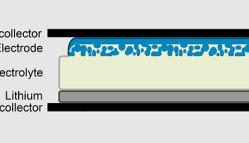Lithium ion batteries that work best at 95°C
August 30, 2016
on
on

Numerous laboratories are working towards reducing or eliminating the accidental risks of Li ion batteries by working on solid electrolytes. Researchers at ETH at Zurich are developing unique solid materials which even when brought to high temperatures will not ignite.
This represents a double advancement over current Li ion batteries which contain inflammable gel electrolytes, because not only does the fire risk disappear, but constraints over form-factor are also much less.
One of the difficulties is to obtain an optimal circulation of electrons between the electrodes and the solid electrolyte. The solution of the Swiss researchers was to use an interface between the materials and consists of using as the electrolyte a lithium garnet, a crystalline material known for its conductivity of Lithium ions.
On the porous surface of the solid electrolyte, the material of the negative pole is applied in a viscous form, and penetrates the pores before solidifying at a temperature of 100°C, unthinkable with a liquid electrolyte.
The trick of using this porous surface has the advantage of considerably increasing the area of contact between the negative pole and the solid electrolyte, and thus accelerating the charge.
The batteries thus obtained work at ambient temperature, but their optimal temperature is 95°C and higher. So they can be used to store the electrical energy used by a generating plant, while recycling – to keep them at a high temperature – the waste heat from a nearby industrial installation.
Another advantage of this process lies in the possibility of making batteries in thin film form, integrated directly on chip. That opens some huge possibilities.
This represents a double advancement over current Li ion batteries which contain inflammable gel electrolytes, because not only does the fire risk disappear, but constraints over form-factor are also much less.
One of the difficulties is to obtain an optimal circulation of electrons between the electrodes and the solid electrolyte. The solution of the Swiss researchers was to use an interface between the materials and consists of using as the electrolyte a lithium garnet, a crystalline material known for its conductivity of Lithium ions.
On the porous surface of the solid electrolyte, the material of the negative pole is applied in a viscous form, and penetrates the pores before solidifying at a temperature of 100°C, unthinkable with a liquid electrolyte.
The trick of using this porous surface has the advantage of considerably increasing the area of contact between the negative pole and the solid electrolyte, and thus accelerating the charge.
The batteries thus obtained work at ambient temperature, but their optimal temperature is 95°C and higher. So they can be used to store the electrical energy used by a generating plant, while recycling – to keep them at a high temperature – the waste heat from a nearby industrial installation.
Another advantage of this process lies in the possibility of making batteries in thin film form, integrated directly on chip. That opens some huge possibilities.
Read full article
Hide full article


Discussion (0 comments)